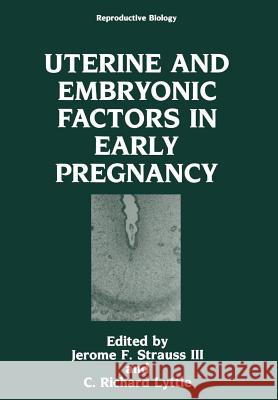Uterine and Embryonic Factors in Early Pregnancy » książka
Uterine and Embryonic Factors in Early Pregnancy
ISBN-13: 9781461364924 / Angielski / Miękka / 2012 / 291 str.
Human reproduction is the most dynamic of processes. The events which lead to the birth of a normal healthy infant have their origin long before actual fertilization. Indeed, the whole process can be looked upon as a continuum. Human fertilization and early development, once sequestered in the protective environment of the fallopian tubes and uterus, have now been exposed in the laboratory. These events have, over time, been extensively observed and catalogued in animal models. The tools of modem morphology and molecular biology have reopened issues long since considered settled as facets of early reproduction are reexplored. This volume, consisting of the proceedings of a workshop on uterine and embryonic factors in early pregnancy, has been designed to enhance that effort. Attention is focused largely on early embryonal development with special attention to the interrelationship between the embryo and the uterus in early pregnancy. Each of the contributing scientists brings with him or her the perspective of one specific discipline or another. The common denominator is the application of emerging techniques in modem molecular biology to problems pertaining to embryonal-uterine interaction. The goal is to consider specific areas of concern in a multidisciplinary way and to reexplore the factors behind early development and implantation. Uterine complement, the function of uterine macrophages immunoregulatory loops in the peri-implantation period, colony stimulating factors and interferon-like factors are reviewed and their interrelationship explored. Uterine angiogenesis factors as well as embryonic growth factors are also considered.











